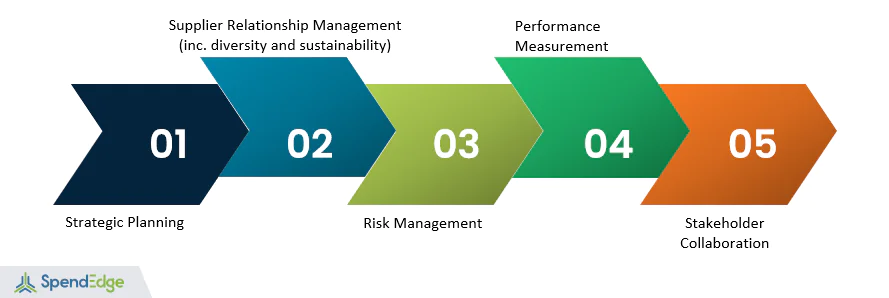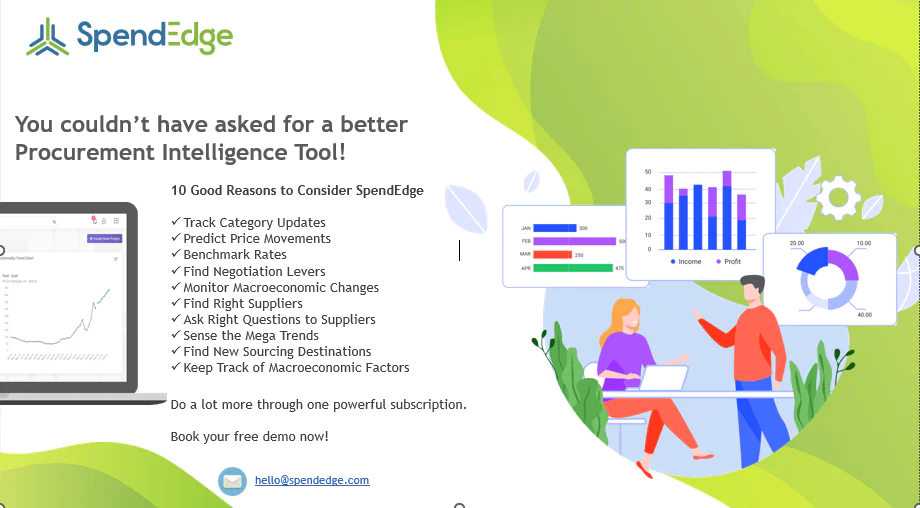Procurement has transitioned from a back-office function focused solely on cost reduction to a strategic driver of business value. Within this transformation, the role of strategic sourcing managers has become increasingly vital. Strategic sourcing involves a proactive and structured approach to identifying, evaluating, and engaging with suppliers to optimize value across the supply chain.
The Evolving Role of Strategic Sourcing Managers:
Historically, procurement was primarily tasked with securing goods and services at the lowest cost. However, globalization, technological advancements, and shifting market dynamics have necessitated a more strategic approach. Strategic sourcing managers now operate at the intersection of finance, operations, and supply chain management. They are responsible for aligning procurement strategies with overall business objectives, driving innovation, and managing supplier relationships.
Our market intelligence solutions can help you with strategic sourcing
Key Responsibilities of Strategic Sourcing Managers:

Strategic Planning:
Strategic sourcing managers are at the forefront of developing and implementing sourcing strategies that align with the overarching business objectives of the organization. This involves a comprehensive understanding of market dynamics, including trends, shifts in demand, and emerging technologies. By conducting thorough market research and analysis, strategic sourcing managers can anticipate changes in the supply chain landscape and proactively adjust sourcing strategies to capitalize on opportunities and mitigate risks. Furthermore, they must assess the capabilities and capacities of potential suppliers to ensure alignment with the organization’s needs and standards.
Supplier Relationship Management:
Cultivating strong and mutually beneficial partnerships with key suppliers is essential for driving value, innovation, and continuous improvement. Strategic sourcing managers act as liaisons between the organization and its suppliers, fostering open communication, trust, and collaboration. They work closely with suppliers to identify areas for innovation and process improvement, leveraging supplier expertise to enhance product quality, reduce lead times, and drive cost efficiencies. Additionally, strategic sourcing managers must monitor supplier performance, provide feedback, and address any issues or concerns in a timely manner to maintain strong relationships.
Risk Management:
In today’s interconnected global economy, supply chain disruptions can have significant repercussions on business operations and financial performance. Strategic sourcing managers are responsible for identifying and mitigating various risks that could impact the supply chain, including geopolitical instability, natural disasters, regulatory changes, and supplier dependencies. They develop contingency plans and alternative sourcing strategies to ensure business continuity in the face of unforeseen events. By conducting risk assessments and implementing robust risk mitigation measures, strategic sourcing managers safeguard the organization’s supply chain and mitigate potential disruptions.
Cost Optimization:
Analyzing the total cost of ownership (TCO) is paramount for strategic sourcing managers in achieving cost optimization without compromising quality or service levels. Beyond the initial purchase price, TCO takes into account various cost factors, including transportation, storage, maintenance, and disposal. Strategic sourcing managers employ cost-saving initiatives such as volume consolidation, supplier rationalization, and process optimization to reduce overall costs throughout the supply chain. By leveraging economies of scale and negotiating favorable terms with suppliers, they drive cost efficiencies while maintaining or enhancing product quality and service levels.
Supplier Diversity and Sustainability:
Promoting supplier diversity and sustainability within the supply chain is not only socially responsible but also strategically advantageous. Strategic sourcing managers actively engage with minority-owned businesses, women-owned enterprises, and other diverse suppliers to foster inclusivity and expand the supplier base. Moreover, they advocate for environmentally friendly practices by encouraging suppliers to adopt sustainable sourcing, manufacturing, and distribution processes. By incorporating sustainability criteria into supplier selection and evaluation, strategic sourcing managers contribute to the organization’s corporate social responsibility (CSR) initiatives and mitigate environmental risks within the supply chain.
Performance Measurement:
Establishing key performance indicators (KPIs) and metrics is essential for monitoring supplier performance, tracking cost savings, and driving continuous improvement. Strategic sourcing managers define measurable objectives and benchmarks to evaluate supplier performance against predetermined criteria such as quality, delivery reliability, responsiveness, and cost-effectiveness. They utilize data analytics and reporting tools to assess performance trends, identify areas for improvement, and drive corrective actions as necessary. By holding suppliers accountable to performance targets, strategic sourcing managers ensure alignment with organizational goals and drive excellence throughout the supply chain.
Stakeholder Collaboration:
Effective collaboration with internal stakeholders across departments such as finance, legal, and operations is critical for the success of procurement initiatives. Strategic sourcing managers engage with cross-functional teams to gain insights into departmental requirements, budget constraints, and regulatory compliance considerations. They collaborate with finance teams to develop budgets and financial forecasts, legal teams to negotiate contracts and manage legal risks, and operations teams to align sourcing strategies with production schedules and inventory management. By fostering collaboration and alignment across departments, strategic sourcing managers ensure that procurement activities are integrated into broader organizational strategies and receive the necessary support and resources for success.
Get yourself a free trial now of our services
Strategic Sourcing vs. Strategic Procurement
Strategic sourcing and strategic procurement are both critical components of supply chain management, but they represent different aspects of the procurement process and serve distinct purposes.
Strategic Sourcing:
Strategic sourcing focuses on identifying, evaluating, and selecting suppliers that can provide goods and services that meet the organization’s needs effectively and efficiently. It involves a proactive approach to supplier selection, negotiation, and relationship management to optimize value and minimize risks. Key elements of strategic sourcing include:
- Supplier Evaluation: Assessing potential suppliers based on criteria such as quality, cost, reliability, and sustainability to determine their suitability for fulfilling the organization’s requirements.
- Negotiation: Engaging in discussions and bargaining with suppliers to secure favorable terms, including pricing, payment terms, delivery schedules, and service levels.
- Supplier Relationship Management (SRM): Cultivating long-term relationships with selected suppliers to foster collaboration, innovation, and continuous improvement. This involves regular communication, performance monitoring, and addressing any issues or concerns that may arise.
- Risk Management: Identifying and mitigating risks associated with the supply chain, such as supply disruptions, quality issues, geopolitical factors, and regulatory compliance.
Overall, strategic sourcing aims to optimize the supply base, enhance value for the organization, and drive competitive advantage through effective supplier management and collaboration.
Strategic Procurement:
Strategic procurement, on the other hand, encompasses a broader set of activities beyond supplier selection and management. It involves the strategic planning, execution, and oversight of the entire procurement process to support organizational objectives and drive value creation. Key aspects of strategic procurement include:
- Demand Planning: Aligning procurement activities with organizational needs and requirements through accurate demand forecasting, inventory management, and strategic planning.
- Category Management: Categorizing goods and services based on common characteristics and developing tailored strategies for each category to optimize sourcing, pricing, and supplier relationships.
- Contract Management: Drafting, negotiating, and managing contracts with suppliers to formalize agreements, establish terms and conditions, and ensure compliance with legal and regulatory requirements.
- Supplier Performance Management: Monitoring supplier performance against key performance indicators (KPIs), service level agreements (SLAs), and other metrics to track performance, identify areas for improvement, and drive accountability.
- Technology and Process Optimization: Leveraging technology solutions and process improvements to streamline procurement workflows, increase efficiency, and reduce costs.
In essence, strategic procurement focuses on optimizing the entire procurement lifecycle, from planning and sourcing to contract management and performance evaluation, to achieve organizational goals and maximize value creation. It involves cross-functional collaboration, data-driven decision-making, and continuous improvement to drive operational excellence and competitive advantage.
To excel in their role, strategic sourcing managers must possess a diverse skill set tailored to the multifaceted demands of procurement:
Analytical Skills: Strategic sourcing managers must demonstrate proficiency in data analysis and market research techniques to identify cost-saving opportunities, assess supplier performance, and evaluate market trends critically.
Negotiation Skills: Strong negotiation abilities are essential for strategic sourcing managers to secure favorable terms and agreements with suppliers, ensuring optimal pricing, quality, and service levels while aligning with organizational objectives.
Communication Skills: Effective communication is paramount for building rapport with suppliers, collaborating with internal stakeholders across departments, and articulating procurement strategies and findings to senior leadership with clarity and persuasiveness.
Project Management: Proficiency in project management methodologies is crucial for strategic sourcing managers to effectively plan, execute, and monitor sourcing initiatives within established timelines and budgets, ensuring alignment with organizational goals and priorities.
Change Management: Strategic sourcing managers must possess the ability to drive organizational change and foster a culture of innovation and continuous improvement within the procurement function, facilitating adaptation to evolving market conditions and business requirements.
Cross-Functional Collaboration: The ability to collaborate seamlessly with cross-functional teams is essential for strategic sourcing managers to leverage diverse expertise and perspectives, align procurement strategies with broader organizational objectives, and achieve strategic outcomes effectively.
Adaptability: Strategic sourcing managers must demonstrate flexibility and adaptability to navigate changing market dynamics, shifting business priorities, and evolving regulatory requirements, ensuring agility and responsiveness in managing procurement processes and supplier relationships.
Impact of Strategic Sourcing Managers on Organizational Success:
Strategic sourcing managers play a critical role in driving organizational success by enhancing cost efficiency through optimizing sourcing strategies and negotiating favorable terms with suppliers, thus contributing to cost savings and improved profitability. Additionally, they mitigate risks through proactive risk management, ensuring continuity of supply and minimizing the impact of disruptions, thereby safeguarding the organization’s reputation and financial performance.
Furthermore, strategic sourcing managers foster innovation by collaborating with suppliers, creating a culture of innovation that enables organizations to stay ahead of competitors and capitalize on emerging market trends. They also strengthen supplier relationships by building strong, collaborative partnerships that foster trust, enable the leveraging of supplier expertise, drive continuous improvement, and mitigate risks. Moreover, these professionals support sustainability initiatives by engaging with environmentally conscious suppliers and implementing sustainable practices within the supply chain, aligning procurement activities with corporate social responsibility objectives.
Conclusion
In conclusion, strategic sourcing managers are instrumental in navigating the complexities of procurement landscape. By adopting a strategic approach to sourcing, they drive cost savings, mitigate risks, foster innovation, and strengthen supplier relationships, ultimately contributing to organizational success. As procurement continues to evolve, the role of strategic sourcing managers will become even more indispensable in driving value and competitive advantage.





